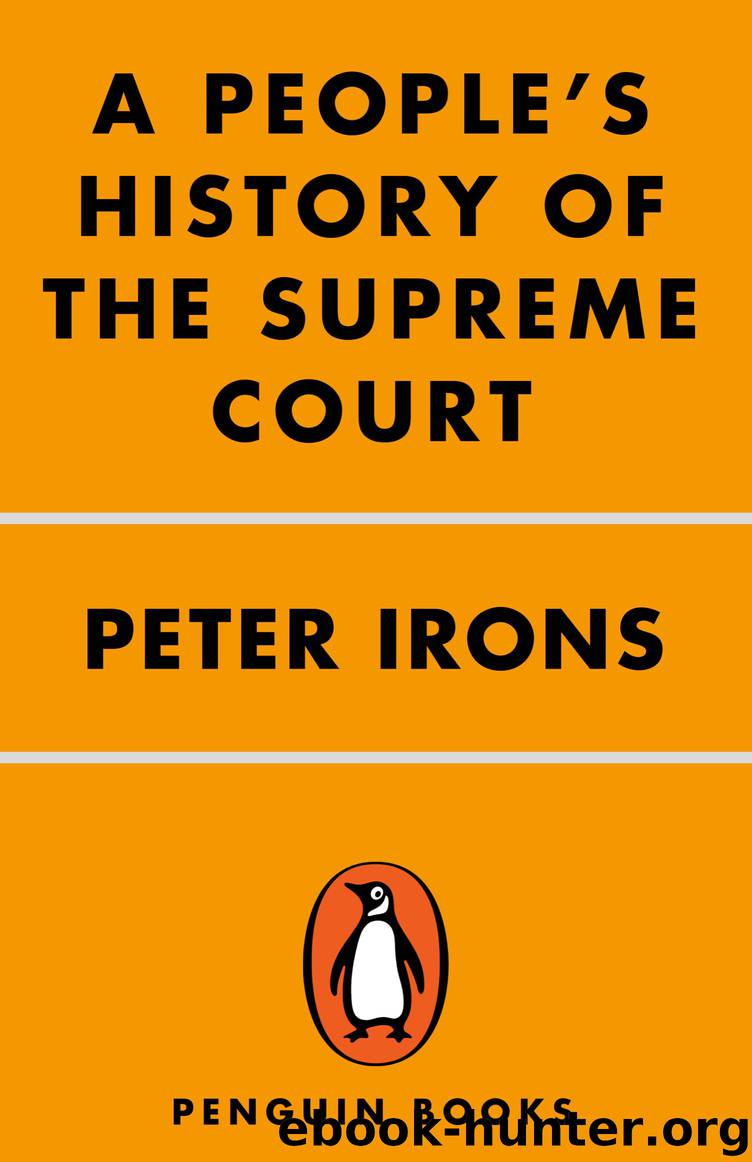A People's History of the Supreme Court by Peter Irons

Author:Peter Irons
Language: eng
Format: epub
Publisher: Penguin Publishing Group
Published: 2006-07-24T16:00:00+00:00
Charlotte Whitney waited two more years for a ruling on her appeal. One reason the Court delayed its decision until May 1927 was that her wealthy family had retained two prominent corporate lawyers to defend her in the California courts. They did not raise any First Amendment challenge to California’s criminal syndicalism law in 1920, which is not surprising, since Barron v. Baltimore had blocked that path since 1833. The justices could have declined to hear Whitney’s appeal, because her lawyers had not raised a “federal question” at trial, which normally would foreclose Supreme Court review of a decision based on state law. In fact, the Court dismissed her first petition for review in 1925, shortly after its Gitlow decision. But a new set of lawyers from the American Civil Liberties Union stepped in and took Whitney’s case back to California; they persuaded state judges to consider a claim that the law was “repugnant” to the Fourteenth Amendment’s Due Process Clause. The ACLU team was headed by Walter Pollak, a prominent New York corporate lawyer who plunged into free speech cases and had argued—and lost—the Gitlow case in the Supreme Court.
The California judges denied Pollak’s new claim without opinion, but they placed it on the record, and he persuaded the Supreme Court to reconsider Whitney v. California in 1927. Writing again for the Court, Justice Sanford reviewed the case’s tangles procedural history and sniffed that Pollak’s move “is not to be commended” as a tactic for gaining a rehearsing. Sanford did not explain why the justices bent their rules in this case; most likely, the conservative majority wanted to warn political radicals that not only could publishing calls for revolution be punished—as Gitlow had ruled-but that simply joining a “revolutionary” group could lead to prison.
Sanford devoted less than two pages to the First Amendment issue in his Whitney opinion. He quoted his own words in Gitlow for the proposition that revolutionary “utterances” could be punished. But he needed to go another step, since Whitney had not been prosecuted for “utterances” of any kind, but simply for joining the Communist Labor Party. Sanford returned to Gitlow and cited the liquor and railroad regulation cases from that opinion to establish state “police powers” over the advocacy of revolutionary doctrine. The act of “joining and furthering an organization” with revolutionary goals, Sanford concluded, was a form of advocacy that made Whitney part of a “criminal conspiracy” whose “united and joint action involves even greater danger to the public peace and security than the isolated utterances and acts” of individuals. Charlotte Whitney was an active organizer, but Sanford’s opinion could be stretched by zealous prosecutors and compliant judges to expose every member of radical groups to criminal charges.
Justice Holmes, having already scolded Sanford in his Gitlow dissent, held his tongue in Whitney. However, Justice Louis Brandeis felt compelled to respond and to voice his own First Amendment views. But he faced two problems. First, he did not think the Court
Download
This site does not store any files on its server. We only index and link to content provided by other sites. Please contact the content providers to delete copyright contents if any and email us, we'll remove relevant links or contents immediately.
2010-The City & the City by China Miéville(1977)
Anatomy of Injustice by Raymond Bonner(1664)
That Every Man Be Armed by Stephen P. Halbrook(1577)
ADHD on Trial by Michael Gordon(1573)
Injustices by Ian Millhiser(1497)
You Don't Own Me by Orly Lobel(1445)
Tell by Major Margaret Witt(1438)
Course Correction by Ginny Gilder(1408)
Broken Scales by Joel Cohen(1350)
Without Copyrights by Spoo Robert(1346)
A Vast Conspiracy by Jeffrey Toobin(1327)
First by Evan Thomas(1283)
J by Howard Jacobson(1256)
A Religious Orgy in Tennessee by H.L. Mencken(1249)
The Run of His Life: The People v. O. J. Simpson by Jeffrey Toobin(1203)
A Triumph of Genius: Edwin Land, Polaroid, and the Kodak Patent War by Ronald K. Fierstein(1197)
A History Of Thailand by Baker Chris(1190)
John Wayne Gacy by Judge Sam Amirante(1114)
Law 101: Everything You Need to Know About American Law, Fourth Edition by Jay Feinman(1100)
